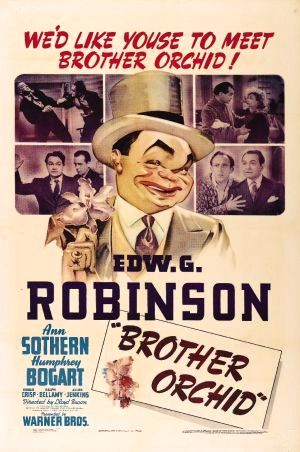
BROTHER ORCHID
US, 1940, 88 minutes, Black and white.
Edward G. Robinson, Ann Sothern, Humphrey Bogart, Donald Crisp, Ralph Bellamy, Cecil Kellaway, Allan Jenkins.
Directed by Lloyd Bacon.
Brother Orchid is rather a surprise. It begins conventionally enough, like many another Warner Brothers gangster film, with Edward G. Robinson playing Little John T, Johnny Sarto. He goes to France and returns after trying to get some class in his life and manner. However, he discovers that his second-in-charge, played by a sinister Humphrey Bogart, has taken over his gang. He takes refuge in a monastery – and his life is transformed and he becomes Brother Orchid.
The picture of monastic life is very sympathetic with Donald Crisp as the superior and Cecil Kellaway as one of the monks. The gangster learns class in the monastery, also learns something of self-sacrifice, giving money to the poor (instead of getting watermelon for dessert for the monastic dinner).
However, Brother Orchid does return to the world when he reads about his fiancée and her intended marriage to Ralph Bellamy. In the outside world, he puts into practice what he learnt in the monastery, giving his money away – and finally returning to the monastery. This might have acted as a moving vocations film and recruitment for the period! In later decades, it is a gentle comedy and something of a light parody of the gangster films.
1. The impact of this film now? In the forties? The trends that it exemplifies in filmmaking? The history of the gangster genre? Does It seem dated?
2. The history of Edward G. Robinson gangster films? Their style, character? action, impact? Insight into Americans gangsters and police? How did this film humorously satirise the tradition and Robinson and his style?
3. The Warner Brothers style of the forties crisp, fact, matter-of-fact?
4. The presentation of the gangster set-up in this tradition? Humphrey Bogart as the gangster leader? The various types? Flo, and the hat-check heroine? Becoming a millionairess? The assistance of Clarence, the nice-guy
hero? How humorous were these ingredients? The quality of the satirical dialogue?
5. The humour of Johnny and his resignation, his tour? The fond farewell? The European capitals and the filming of his bad deals? His return in humiliation? stupidity in expecting to come back once again? His
sentimentality in return and its change into reaction to violence?
6. The portrayal of the gang war? How serious, how humorous?
7. Johnny's ironic arrival at the Brotherhood? The presentation of the Brothers, their characters, religious dedication? Their community way of life? The satire on religious films? Johnny's immediate conversion?
8. The humour of his crusade for the Brothers and the fight against gangster protection? The humour of the religious motivation for Johnny’s gang warfare?
9. The filming of his success? The small man conquering Humphrey Bogart etc.?
10. The contribution of Flo and her love for Johnny? The pious and good-natured assistance of Clarence? Johnny? stepping back for Clarence to marry Flo?
11. The sentimental and humorous religion of Johnny’s return to the Brothers?
12. How successful was this tongue-in-cheek version of Hollywood sending its own genres up?